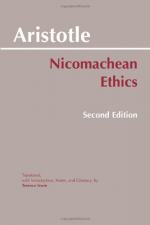|
This section contains 1,273 words (approx. 4 pages at 400 words per page) |

|
Book V Summary and Analysis
Aristotle next turns to the topic of justice and what constitutes just or unjust actions. The state of justice in an individual is commonly thought of as the state where a person performs just acts and wishes for just things, Aristotle claims, and injustice is the opposite state. His discussion of justice will begin from these popular notions of the term. Here, as elsewhere, Aristotle uses already common beliefs to ground his philosophy in the practical world. He is very careful to ensure that his ethics does not violate any widely accepted notions lest it be rejected as impractical. He remarks that both justice and injustice are spoken of in many ways. An unfair person is sometimes called unjust, for example, as is a greedy person.
There are two types of justice, Aristotle claims, general justice and special justice...
(read more from the Book V Summary)
|
This section contains 1,273 words (approx. 4 pages at 400 words per page) |

|




